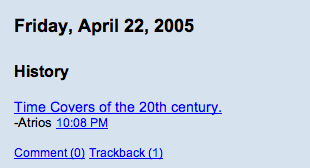If you’ve never been linked from one of the well-known blogs, you really should try it. As probably anyone here knows already, the Eschaton blog linked my parody TIME covers of Hitler and Stalin (based on Ann Coulter interviewer John Cloud’s comments in CJRDaily) late on Friday night:

This blog gets between 350 and 600 page views (as opposed to raw hits) each day, as a mean average, and half of those are RSS feeds: aggregators and blog readers just checking in to see if anything’s new. So, really, about 200-250 people actually looking for political stuff, the ocassional post on Macromedia Director, what have you. My big days are when I post pictures from a conference or something.
During the day before the TIME covers made it onto Atrios, I had between 13 and 38 page requests each hour. The first hour after the post, it jumped to nearly 1,100. It dropped down pretty fast, but it was the middle of Friday night. It actually got back down to single digits by the sixth hour, but as people woke up Saturday morning, it spiked again to 500-600 for several hours. The first full day after Atrios’s post, the number of page views was up to nearly 6,000.
Sunday’s traffic dropped back to near-normal levels — at least, normal for a weekday. The images were posted a number of other places (like Cup O’ Joe) and without looking at the raw data more than I care to, it’s impossible to sort out how much of that was people clicking on a link or the pictures embedded on other pages.
By Monday, most everyone visiting Eschaton had seen the images, but ripples were still going out. Cup O’ Joe accounted for over 300 raw hits on each picture. Cheers and Jeers (now featured on the front page of Daily Kos) put up a link in a prominent final position that accounted for about 500 page views. The pictures showed up on discussion boards on Democratic Underground, Smirking Chimp, and elsewhere.
Between 7pm Pacific Friday when Atrios’s post went live and 1am Tuesday morning — 78 hours — the Hitler and Stalin covers I created got over 11,500 hits each , with about 8,000 coming directly as a result of Atrios’s post and the others coming from people who’d seen them there and posted links themselves. My follow-ups (Idi Amin and David Duke) could be considered as a sort of control group, since they didn’t get mentioned on Eschaton. The Duke cover parody is getting about 40 hits per day, likely from folks like you who have bothered to keep checking back to see if I did anything else good. That’s a 150:1 ratio.
Such is the power of Atrios.
referrer links from atrios.blogspot.com
|
|
22 April 2005
(7pm PDT midnight)
|
3109 |
|
23 April 2005
|
4367 |
|
24 April 2005
|
375 |
|
25 April 2005
|
47 |
|
26 April 2005
|
4 |



